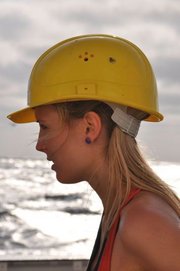Karolina Bohata

Dr. Karolina Bohata
Institut for Hydrobiology and Fisheries Science
University of Hamburg
Große Elbstraße 133
22767 Hamburg
Telephone: +49(0)40 - 428 386 677
E-mail: karolina.bohata@uni-hamburg.de
Karolina successfully defended her PhD thesis in spring 2016. Congratulations!
Title of Ph.D. thesis:
Microzooplankton of the northern Benguela Upwelling System.
Supervising tutors:
Prof. Dr. Christian Möllmann, University of Hamburg, Germany
Prof. Dr. Friedrich Buchholz, University of Hamburg, Germany
University Education:
2015: Successful defence of the PhD thesis
2012-2015
PhD student at the University of Hamburg
2009 - 2011
Graduate studies (MSc.) in Marine Fisheries Science at the Institut for Hydrobiology and Fisheries Science , University of Hamburg, Germany.
Master thesis: Biomass, abundance and trophic position of Chaetognatha species in the Namibian Upwelling Region.
2006 – 2009
Undergraduate studies (BSc.) in Biology at the University of Hamburg, Germany.
Bachelor thesis: Spring mortality of Temora longicornis in the Central Baltic Sea.
Outline GENUS Sub-Project 5:
The role of micro- and mesozooplankton in the Namibian Upwelling ecosystem, their contribution to the organic matter flux and benthic interactions.
The main goals of Sub-Project 5 are to examine the horizontal and vertical distributions of different groups of zooplankton, their trophic role and their contribution to the oceanic carbon cycle in the high productive Benguela Upwelling region.
Main Research Interests :
The role of microzooplankton in the food web:
Microzooplankton organisms are important in pelagic food webs. Until now, microzooplankton have been investigated only sparsely in the Namibian Upwelling Region despite their importance for the microbial loop and their potential relevance as food for larger zooplankton. To quantify the role of microzooplankton in the food web in the Benguela Upwelling Region, following investigations are planned:
- Abundance and biomass of different microzooplankton taxa in the Northern Benguela upwelling system by multinet catches and water samples from the CTD
- Grazing pressure of microzooplankton on primary producers (dilution method experiments)
- Contribution of microzooplankton to the diet of copepods
- Trophic position of different taxa (stable isotope analyses)
- Short-time differences depending on environmental changes (time series analyses)